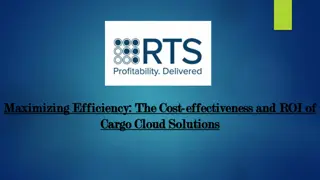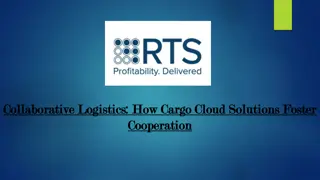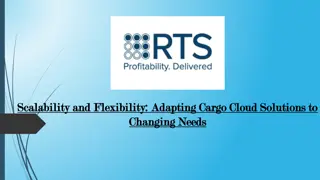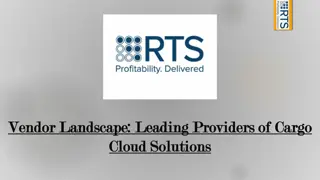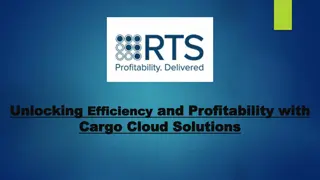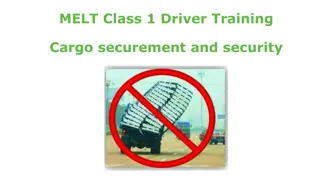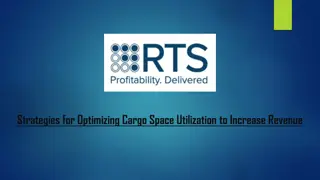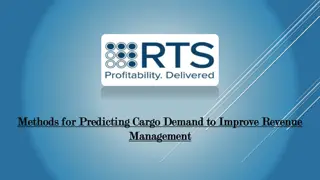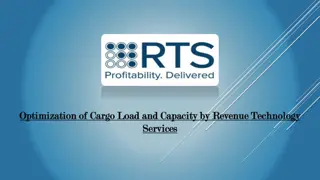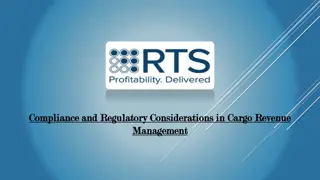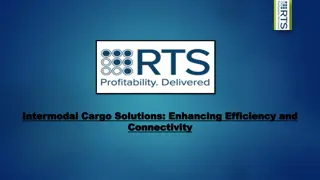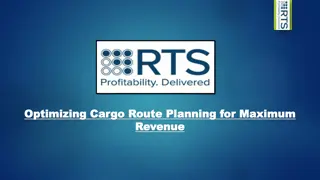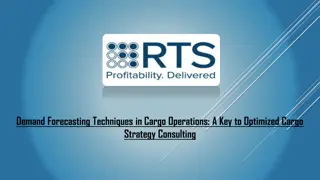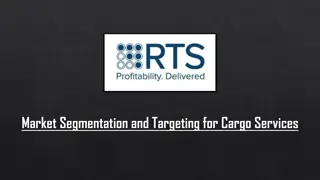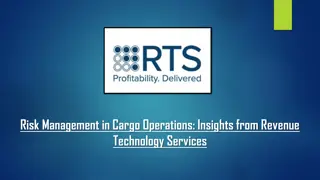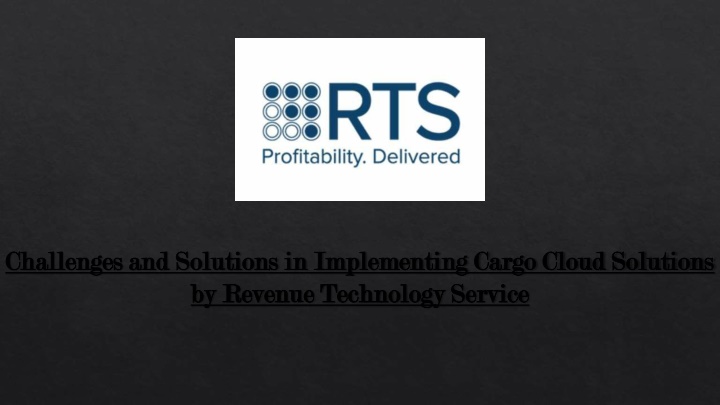
Challenges and Solutions in Implementing Cargo Cloud Solutions (1)
In the dynamic world of logistics, cloud technology has emerged as a game-changer, offering unprecedented agility, scalability, and connectivity. Implementing cargo cloud solutions can radically enhance the efficiency and reliability of operations. However, transitioning to a cloud-based system presents its own set of challenges, particularly for revenue-focused technology services. Here, we delve into some of the key hurdles and propose practical solutions to help businesses navigate this transformation effectively.n
Download Presentation

Please find below an Image/Link to download the presentation.
The content on the website is provided AS IS for your information and personal use only. It may not be sold, licensed, or shared on other websites without obtaining consent from the author. If you encounter any issues during the download, it is possible that the publisher has removed the file from their server.
You are allowed to download the files provided on this website for personal or commercial use, subject to the condition that they are used lawfully. All files are the property of their respective owners.
The content on the website is provided AS IS for your information and personal use only. It may not be sold, licensed, or shared on other websites without obtaining consent from the author.
E N D
Presentation Transcript
Challenges and Solutions in Implementing Cargo Cloud Solutions Challenges and Solutions in Implementing Cargo Cloud Solutions by Revenue Technology Service by Revenue Technology Service
In the dynamic world of logistics, cloud technology has emerged as a game-changer, offering unprecedented agility, scalability, and connectivity. Implementing cargo cloud solutions can radically enhance the efficiency and reliability of operations. However, transitioning to a cloud-based system presents its own set of challenges, particularly for revenue-focused technology services. Here, we delve into some of the key hurdles and propose practical solutions to help businesses navigate this transformation effectively.
Challenges in Implementing Cargo Cloud Solutions Challenges in Implementing Cargo Cloud Solutions 1 1. . Data Security and Privacy Data Security and Privacy One of the primary concerns when adopting any cloud-based technology is the security and privacy of data. In the cargo industry, where sensitive information such as shipment details, customer data, and transaction records are frequently exchanged, the risk is even more pronounced. Solution: Choosing a cloud service provider that complies with stringent security standards, such as ISO/IEC 27001, can mitigate these risks. Implementing end-to-end encryption, regular security audits, and robust access controls can further safeguard sensitive information. Moreover, educating employees about security best practices is crucial. 2. Integration with Existing Systems 2. Integration with Existing Systems Many logistics companies use a variety of software systems that may not be immediately compatible with new cloud solutions. This can lead to significant integration challenges. Solution: Opting for a cloud platform that offers flexible APIs and has a proven record of compatibility with existing logistics software is vital. Additionally, working with experienced IT specialists who can manage the integration process smoothly ensures that systems communicate effectively, minimizing downtime and maintaining productivity during the transition.
3. Cost Implications 3. Cost Implications While cloud solutions can be cost-effective in the long run, initial implementation can be expensive due to the need for new hardware, software, and training. Solution: Solution: A phased approach to implementation can spread out costs and reduce financial strain. Starting with a hybrid model where only parts of the operations are moved to the cloud can help manage expenses while demonstrating ROI from the sections that are cloud-enabled. 4. Compliance and Regulatory Issues 4. Compliance and Regulatory Issues The logistics sector is heavily regulated, and companies must comply with various international, national, and local regulations. Ensuring that cargo cloud solutions adhere to these regulations can be daunting. Solution: It is crucial to select cloud providers who not only understand these regulatory landscapes but who actively ensure that their solutions are compliant. Regular compliance audits and updates can also help in maintaining standards.
5 5. Resistance to Change . Resistance to Change Change management is often an overlooked aspect of implementing new technologies. Employees used to traditional systems may resist moving to a cloud-based approach due to fear of the unknown or a perceived increase in complexity. Solution: Effective change management strategies, including comprehensive training sessions and clear communication about the benefits of the new system, can ease this transition. Encouraging employee participation in the planning and implementation phases can also foster a sense of ownership and acceptance.
Conclusion Conclusion The implementation of cargo cloud solutions by revenue technology services is fraught with challenges but none that are insurmountable with thoughtful planning and strategic action. Overcoming these obstacles not only boosts operational efficiency but also enhances scalability and resilience in the face of evolving market demands. As more companies recognize these benefits, the adoption of cloud technologies in logistics is set to increase, paving the way for more innovative and integrated global supply chain solutions. By focusing on tailored solutions that address these specific challenges, businesses can leverage the full potential of cloud computing to revolutionize their cargo handling capabilities.
THANK YOU THANK YOU



